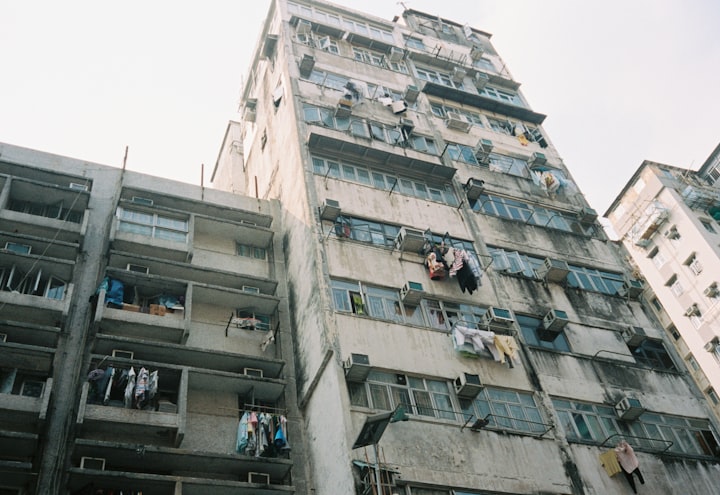Why We Can't Ignore The Link Between Racism And Mental Illness In The Black Community
It is an unfortunate truth that African Americans in our society face systemic oppression on a daily basis.

This oppression has a devastating impact on the mental health of members of the Black community, creating a strong link between racism and mental illness that we can no longer ignore. It is essential to understand how racism is intertwined with the mental health of African Americans, and what can be done to create a more supportive and equitable society. Here, we will explore the connection between racism and mental illness in the Black community and how we can work together to help those affected.
Racism Is a Public Health Issue
Racism has been identified as a major public health issue, with far-reaching effects on both physical and mental health. It is often overlooked in conversations about public health, but its impact can be felt throughout society. Racial discrimination can manifest in many forms, including racial profiling, verbal and physical abuse, unfair treatment, and lack of access to resources. These experiences lead to feelings of helplessness, fear, and anxiety that can have long-term effects on mental health. Additionally, racism is embedded in our culture and can be passed down from generation to generation, creating a cycle of mental illness in minority communities. It’s important to recognize the role racism plays in the mental health of people of color and address it in order to create a healthier society.
Can The Stress Of Racism Lead To Mental Illness?
It's no secret that racism is one of the major public health issues in the United States today. While the effects of racism can be seen in many areas of life, one of the most damaging effects is the potential for it to lead to mental illness. It is well-documented that those who have faced racial segregation and discrimination are more likely to suffer from mental health issues, such as depression and anxiety.
The stress of racism can manifest itself in a variety of ways, including through economic disadvantage and criminalization. Those who are denied access to economic opportunities and are instead relegated to welfare or other forms of state assistance are particularly vulnerable to the impact of racism on their mental health. This is often because they lack access to the resources needed to cope with these situations. Additionally, people of color are more likely to be criminalized and marginalized by society, which can further lead to mental health issues.
In addition to these external factors, racism can also take a toll on someone’s mental health by removing the values and morals passed down from their ancestors that are detrimental to one’s self-esteem and sense of self-worth. Those who grow up in communities where racial tensions are high can internalize these negative views of themselves and begin to believe that they are somehow lesser than others. This can lead to feelings of isolation and a lack of self-confidence, which can ultimately lead to mental health issues.
It’s important that we recognize the connection between racism and mental illness, and take steps to address this issue. We must recognize that racism has real consequences for individuals’ mental health, and work towards creating an environment where everyone is respected and valued equally. Only then will we be able to truly address the issue of mental illness in the black community.
Racism Can Be Passed Down From Generation To Generation
The effects of racism are far-reaching and devastating, spanning multiple generations. The systemic oppression that began with the enslavement of African Americans has been passed down through generations and continues to affect many aspects of life, from low income and unemployment to poverty and racial profiling. The impact of racism on mental health has been well-documented, with studies showing that people of color who experience racism are more likely to suffer from mental illnesses like depression, anxiety, and post-traumatic stress disorder (PTSD).
Furthermore, racism has been linked to physical health disparities, such as heart disease and stroke rates. Unfortunately, unequal access to resources for the black community is deeply entrenched in our society today. The prevalence of low-income housing(the projects) and unequal access to healthcare, even during the pandemic, continue to create an atmosphere of modern-day slavery. This lack of access to resources combined with the continuous racial profiling and discrimination leads to a cycle of poverty that is passed down through generations.
Given the known persistence of white privilege, racial profiling, injustice, and the disproportionate impact of the incarceration rate on people of color, it’s difficult to comprehend why mental health issues are frequently disregarded in the black community. We must have more conversations about race and mental health in order to break the cycle of generational poverty and recognize the connection between racism and mental illness. We must also advocate for improved access to quality healthcare, including mental health care, for communities of color. Only then will we be able to begin to heal from the legacy of racism.
COVID-19 has further exacerbated economic and health inequalities experienced by communities of color, making health insurance increasingly unaffordable and inaccessible. Many people living in low-income areas have been hit especially hard due to their decreased ability to get medical care or access basic necessities. This means that issues related to mental health may go unchecked or untreated, leading to further deterioration of one’s overall health.
Projects and other forms of housing inequality(the hood) can also contribute to poor mental health outcomes. Without proper support systems in place, people may struggle to cope with chronic stressors related to racism and socioeconomic disadvantages, further worsening their health. It’s essential for us to become aware of the link between racism and mental health so we can take action to support those who are most vulnerable to the impacts it has on these communities.
Why Is Mental Illness In The Black Community So Often Ignored?
Mental illness in the Black community is often ignored due to a variety of factors, such as unemployment, culture, low income, and crime rate. Due to high levels of unemployment, many in the Black community are unable to afford mental health services. Additionally, there is a stigma surrounding mental health in the Black culture that has been historically passed down from generation to generation. Low-income individuals also face additional barriers to accessing mental health care, such as cost and transportation.
The Black community is also disproportionately affected by the high crime rates that often accompany poverty, further complicating access to healthcare services. This combination of poverty, lack of access to healthcare, and cultural stigma leads to mental health issues being overlooked or ignored. For example, unemployment rates among African Americans have consistently remained higher than those for other racial groups. This creates an environment where obtaining treatment for mental health problems can be especially difficult for those who don’t have the resources necessary to seek it out and also affects the quality of life for these communities and their children and ultimately furthers the cycle generationally.
Additionally, because of ingrained negative stereotypes about mental illness within the culture, members of the Black community are less likely to seek help when they’re experiencing depression, anxiety, or other mental health issues. Low income further exacerbates this problem as African Americans typically have fewer financial resources at their disposal than other racial groups when it comes to seeking medical attention.
Finally, crime rates can be incredibly destabilizing to communities and can lead to an increased sense of anxiety and depression in those who live in areas where crime is especially high. All these factors contribute to why mental illness in the Black community continues to go untreated and overlooked.
We Need To Talk More About Races Of All Colors And Mental Illness
Mental health issues affect people of all races and backgrounds, but the effects are greater and more devastating in certain communities. The effects of racism on mental health cannot be ignored. Racism is an ever-present force in our society, from racial profiling by law enforcement to disparities in healthcare access and economic opportunities. People of color, especially those in the Black community, experience higher levels of stress due to systemic racism, which can lead to mental illness.
The conversation around mental health needs to include discussions of race and ethnicity. For example, it’s important to recognize that the cultural context of one’s identity plays a role in how one perceives and responds to mental illness. Different cultures have different attitudes and beliefs about mental health, which must be taken into consideration when treating mental illness within specific racial or ethnic groups.
It’s also important to recognize the disparities in access to care that exist between different racial groups. In the Black community, for instance, there are often fewer resources available for mental health treatment, leading to inadequate care and further perpetuating the cycle of mental illness. We need to talk more about these issues and make sure that everyone has access to the same quality of care regardless of race.
By raising awareness about the mental health challenges faced by various racial and ethnic communities, we can begin to bridge the gap between mental health treatment options and those who need them. It’s time for a conversation about race, mental health, and access to care that allows us to move forward toward a more equitable society for all.
The Difference Between Racism And Prejudice
Racism and prejudice are two distinct concepts that are often confused.
Racism is defined as the belief that certain races or ethnicities are superior to others, while prejudice is an attitude of aversion or hostility towards certain groups of people.
Understanding the difference between the two is important to combat racism in our society.
Prejudice is based on personal opinions, whereas racism is a form of oppression and discrimination with more systemic consequences. Racism often manifests in the form of white privilege, racial profiling, and modern-day slavery. It can also be seen in the disparities between income levels of different racial and ethnic groups.
The effects of racism are not just limited to economic issues, however. Racial discrimination has a profound impact on mental health, as those facing systematic oppression often suffer from depression and anxiety. This mental health burden is further compounded by a lack of access to quality health insurance and high crime rates in neighborhoods with low-income housing.
It’s time for us to start talking about racism openly and honestly if we ever want to address the issues of prejudice and mental health in the black community. By understanding the difference between racism and prejudice, we can begin to take steps toward creating a more inclusive society.
Does The Government Promote Racism?
The idea that the government can promote racism is a difficult one to grapple with. Yet, the evidence is clear; racism does exist in our government institutions and policies. Studies have shown that race does play a significant role in the allocation of resources, including access to education, low-income housing, and employment opportunities. African Americans, for example, face an unequal playing field when it comes to competing for jobs. Many employers admit to practicing discriminatory hiring practices, while others may be less overt but still prioritize people of a certain race over another.
Low income and poverty rates are also significantly higher among African American populations than any other group in the United States. This further entrenches disparities in education, access to resources, and employment opportunities. Furthermore, government policies that focus on punishing “crime” disproportionately target African American individuals, which then serves to further compound the already existing mental health disparities within this population.
Ultimately, racism is a moral issue, and it is up to the government to ensure that all people receive fair and equal treatment regardless of race. It is only by recognizing the ways in which our society has enabled racism to persist that we can begin to dismantle this institutionalized oppression and work toward racial justice.
Low Income And Poor Education In The Black Community
The effects of racism in the black community can be seen in the form of low income and poor education. The black population often faces higher rates of unemployment than other races, resulting in a lack of economic stability. This economic instability, combined with inadequate access to healthcare and resources, leads to a cycle of poverty in the black community. Furthermore, this poverty can contribute to a lack of mental health services, as many cannot afford them or do not have access to it.
This can also lead to an increased reliance on welfare. While welfare is designed to help those in need, it can also create feelings of dependence and inadequacy in those who rely on it. This dependency may add to the negative psychological effects that come with being marginalized. In addition, many communities with higher rates of poverty lack quality educational institutions, leading to lower levels of educational attainment, which can prevent individuals from gaining economic stability and achieving career goals.
In order for the black community to achieve equality, more attention must be paid to the relationship between racism, low income, and poor education. Access to mental health services should be improved, and more effort must be made to break the cycle of poverty. We cannot build a more fair and just society unless we are mindful of the harm that racism brings to the black community and take measures to correct it.
We Are All God's Children And Equal Under The Sun
It is important to recognize that racism still exists in the world today and that it has lasting effects on all members of society, particularly those in the Black community. Racism and white privilege have created a system where Black people are more likely to suffer from poverty and low income than other racial groups, and can be subject to racial profiling, criminalization, and modern-day slavery. In addition to these issues, people of color are less likely to have access to quality mental health care due to the lack of health insurance and the stigma surrounding mental health issues.
Unfortunately, these disparities continue to widen the gap between different races, perpetuating cycles of poverty and oppression that many Black people feel they cannot escape. We must remember that at the end of the day, we are all God's children and should be treated as equals. We must work together to create a more equitable society by addressing disparities in income, access to education, and affordable housing. We must strive for a world in which everyone has equal access to opportunities and resources regardless of race or ethnicity.
About the Creator
Les Morgan
Mindful! www.mindpizza.com. Dedicated to discovering ways to assist those in need, from mental health to physical and financial health for overall increased mental well-being and a healthier lifestyle. We do the work, you do the healing.






Comments
There are no comments for this story
Be the first to respond and start the conversation.